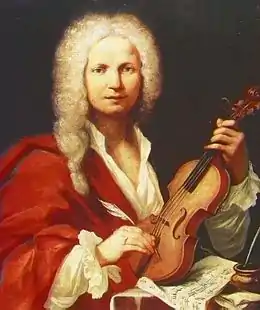Armida al campo d'Egitto
Armida al campo d'Egitto is an opera in three acts by Antonio Vivaldi to a libretto by Giovanni Palazzo. It was first performed during the Carnival season of 1718 at the Teatro San Moisè in Venice. Vivaldi's version is different from the more than 50 operas whose themes derive in varying degrees from the story of Rinaldo and Armida in Torquato Tasso's epic poem La Gerusalemme liberata (Jerusalem Delivered).[1] Unlike the more than 50 operas based on the romance of Rinaldo and Armida, Vivaldi's version starts during previous events before the war against the Crusaders. Armida was revived for the Carnival season of 1738, with much of the music rewritten, and arias by Leonardo Leo added. Act II of the original version of the opera is now lost.
| Armida al campo d'Egitto | |
|---|---|
| Opera by Antonio Vivaldi | |
 Probable portrait of Antonio Vivaldi, c. 1723 | |
| Librettist | Antonio Maria Lucchini |
| Language | Italian |
| Premiere | 1718 Teatro San Moisè, Venice |
Roles
| Role | Voice type | Premiere cast[2] |
|---|---|---|
| Armida, a royal princess | contralto | Antonia Merighi |
| Califfo, King of Egypt | bass | Annibale Imperatori |
| Tisaferno | contralto castrato | Francesco Braganti |
| Adrasto | contralto (en travesti) | Costanza Maccari |
| Emireno, a general | soprano castrato | Francesco Natali |
| Erminia, a royal princess | soprano | Chiara Orlandi |
| Osmira, Califfo's niece | soprano | Rosa Venturini |
Recordings
Complete recording with a restored version of Act II:
- Armida al campo d'Egitto (Concerto Italiano; Rinaldo Alessandrini, conductor). Label: Naïve OP30492. (2010)
The overture to Armida al campo d'Egitto can be heard on:
- Vivaldi: Opera Overtures (I Solisti Veneti; Claudio Scimone, conductor). Label: Apex 2564605372.
- Sinfonie d'opera (I Virtuosi delle Muse; Stefano Molardi, conductor). Label: Divox CDX 70501–6.
Two arias from the work, Invan la mia pietà tenta l'ingrato and Chi alla colpa fà tragitto, can be heard on:
- Vivaldi: Arie Per Basso (Lorenzo Regazzo, bass; Concerto Italiano; Rinaldo Alessandrini, conductor). Label: Naive 30415.
References
Notes
- Jellinek, George (1994) p.,. 354
- Libretti a stampa: Armida al campo d'Egitto Archived 2011-09-28 at the Wayback Machine, www.italianopera.org. Accessed 30 September 2008
Sources
- Booth, John (1989) Vivaldi, Omnibus Press, p. 71. ISBN 0-7119-1727-2
- Jellinek, George (1994) History Through the Opera Glass: From the Rise of Caesar to the Fall of Napoleon, Pro/Am Music Resources, p. 354. ISBN 0-912483-90-3